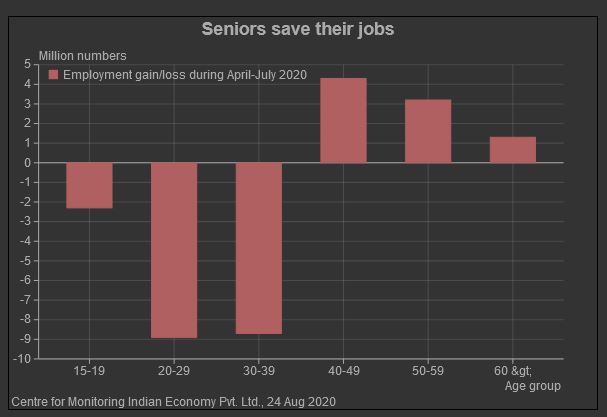Business Desk, ETV Bharat: The young working population of India, especially those in their 20s, has been the biggest casualty of job losses in the economy in recent months of financial crisis, according to independent think tank Centre for Monitoring Indian Economy Pvt. Ltd (CMIE).
CMIE data says that working people aged between 20 years and 29 years in India accounted for a whopping 81% of the total job losses in the country till July 2020 as the economy battled the coronavirus-induced slowdown.

The age group of 20-24 years, which makes up less than 9% of India’s total employment force, accounted for a huge 35% of the total job losses, said CMIE. Meanwhile, those in the age bracket of 25-29 years, who make up 11% of the workforce, accounted for a whopping 46% of all job losses.
CMIE’s managing director Mahesh Vyas explained that though the lockdown led to job losses in every age bracket in April, the uneven recovery of jobs across age brackets in subsequent months led to such a situation.
Vyas noted that the month of May saw a small but significant improvement in the jobs market, when almost all age-brackets reduced their losses, except those in the 25-29-year age bracket.
Read more:States stare at Rs 2.35 lakh cr GST revenue shortfall; Centre gives 2 options to borrow via RBI
“Turnaround in labour markets was almost dramatic in June and this showed in an across-the-board improvement in jobs,” Vyas said. However, recovery in July was smaller and “discriminating”.
“Although overall job losses declined in July, they increased among people from 25 through 34 years of age and for those in their early 50s. It is difficult to generalise these two groups. Those in their early 50s lost 1.5 million jobs on a base of about 48 million jobs. Those between 25 and 34 years lost 0.98 million jobs on a base of 88 million jobs,” Vyas said.
Reasons behind young people losing jobs
CMIE noted that a slowing economy generates lower demand for labour and since enterprises are expanding lesser than earlier, they are generating lesser demand for additional labour.
“Additional demand for labour is usually met by youngsters who join the labour force. But, with the slowdown, the demand for this young new labour force has shrunk,” Vyas said.
Also, the younger workforce in an enterprise is less experienced and is, therefore, considered more easily dispensable. “In the initial years, enterprises invest into fresh labour to make them useful. In difficult times, they are less willing to make such an investment. As a result, the axe falls more quickly on youngsters,” Vyas explained.
He also said that lockdown has made it difficult for enterprises to hire and train new recruits easily. “This is a new constraint. But this is a very serious constraint since it is now quite prolonged,” Vyas noted.



